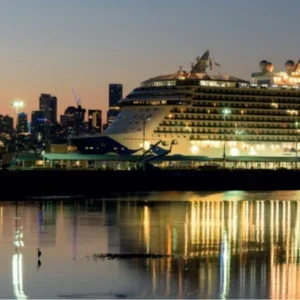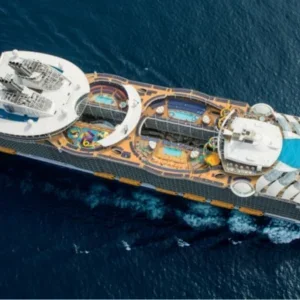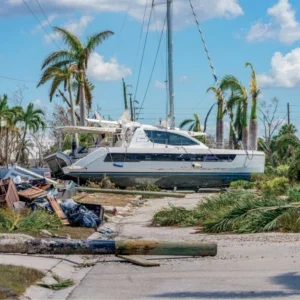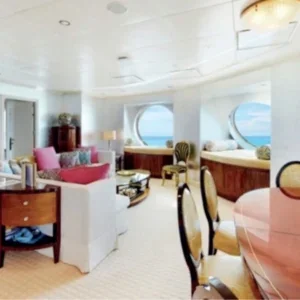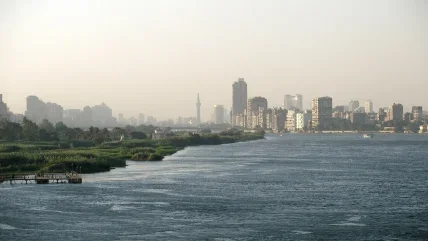
In the fifth century BCE, the Greek historian Herodotus wrote that “Egypt was the gift of the Nile”. A constant source of sustenance, the river’s propensity to burst its banks and flow into surrounding fields gifted the ancient Egyptians with fertile land that swiftly became a highly advanced agrarian system. A trading network built around wheat, papyrus and other crops helped the country cement itself as a necessary ally to its surrounding neighbours, while the river itself acquired a somewhat spiritual dimension. In contrast with the inhabitants of the desolate Sahara, this crystal blue water source was seen by locals as proof that the gods – and the pharaoh – had destined the Egyptians for greatness.
While those once great civilisations withered and crumbled, the preserved Hieroglyphs etched into the tombs and temples in Cairo continued to tell a story of a river and its people. It was a tale that fired the late Victorian imagination, sending Thomas Cook and a group of well-to-do guests on a three-month trip to the 'Mother of the World' in search of mystique, exoticism and – in Cook’s case – a profitable new business venture.
With awe inspiring relics such as the pyramids located near the Nile’s banks, Cook established an armada of paddle steamers to ferry the moneyed and adventurous along the waterway. Then he opened his eponymous hotel in Luxor in 1887 near the gilded temples of Karnak to complete the route.
Ultimately, Cook’s greatest triumph was to sell Egypt to the world, cementing the land of the great pyramids in popular imagination. Good marketing brought a famous clientele, including Rudyard Kipling, Arthur Conan Doyle and Agatha Christie aboard his steamships. Even now there is a two year waiting list for passengers eager to stay on board the old S.S. Sudan, on which Christie’s 1937 novel Death on the Nile takes place.
Cruise down the Nile’s shimmering cold waters today and it is clear that a unique kind of exoticism still holds sway over travellers eager to feel and see an entrancing river that once shaped the trajectory of an entire civilisation.
It’s a sentiment that Miguel Cancino, co-founder of Nile cruise company Nour El Nil, knows only too well. However, before our conversation goes any further, Cancino is quick to point out that steamships on the Nile are a relatively new phenomenon. Rather, the popular retelling of Cook’s tale omits the fact that, for centuries, the waterway was populated by local Egyptians who ferried themselves along the water in dahabiyas or feluccas, simple, triangular-sailed boats carrying between six to eight passengers.
43°C
The height of daily temperatures along the Nile between June and August.
Nour el Nil
“We are the people who reintroduced the dahabiya to the Nile after a 200-year hiatus,” says Cancino, with noticable pride in his voice speaking about his fleet of hand-crafted dahabiyas.
An invitation to explore
Established some 25 years ago, with local Egyptian sailor Memdouh and Cancino’s partner Eleonore, the venture has grown significantly since its early days, with a strong fleet of ships emerging to serve a diverse array of guests eager to explore the country by boat.
“We said okay, ‘let’s build this dahabiya that once existed’,” Cancino recalls. “That became the Aswan, our first boat. It was only 37m long, but we never anticipated it being packed so we never thought about having a room for us. When it filled up we had to sleep on the deck after everybody went to sleep.”
With six vessels offering different levels of luxury and spaciousness, the company markets itself as an ‘authentic way to experience this extraordinary country’ through a concise six-day passage from the merchant town of Esna, near the ancient temple of Khnum, to the desert city of Aswan.
“At the beginning, we were the only ones on the Nile for [about] seven or eight years, so it was wonderful, and then they woke up,” Cancino explains. “There was a moratorium on licenses. And at that time, it would cost you $8–10m to buy a [cruise] licence. If the boat rotted, you’d have to build another one. So, basically only wealthy people could do it. Then people began to scratch their head. Even the government had no idea about dahabiyas.”
A quarter of a century on, the Nile has acquired more boats and Cancino has more rivals than in those early years, even though as he assures me Nour El Nil retains a unique selling point in the form of its dahabiyas.
While Egypt itself has suffered – particularly since the violent uprising of 2011, which damaged the country’s long-standing image as a popular tourist destination – its great river has held its allure. While Viking cruise lines has operated on the Nile for some time, the addition of AmaWaterways represents new competition, along with renowned travel operator Abercrombie & Kent, which caters to a luxury clientele with ten-day trips costing $7,595 per person.
Seeing renewed interest in the region after a pandemic-induced downturn, Viking have delivered a new vessel, Viking Aton, to capitalise on what looks like a growing demand for novel experiences in the land of the pharaohs. “Egypt remains a top destination for many of our guests who are inspired to discover the rich history and beauty of the region,” said Torstein Hagen, chairman of Viking. Meanwhile, the AmaDahlia, AmaWaterways’ new Nile River ship, sets sail on its maiden cruise this winter. All of this gives the impression that things on the Nile have been plain sailing, but the pandemic did have a notable impact. From 22 March, Cancino was forced to cancel cruises until the preceding September as Covid-19 began to spread, meaning Nour El Nil lost a good chunk of business that summer. Even so, Cancino generally advises against cruising the Nile from June to August as daily temperatures can reach 43ºC.
“It was not a terrific year, but was it was okay. It was down from what I would call a normal level prior to the pandemic when were just doing really, really well,” Cancino says. “We started again in the winter and carried on until May this year. It was not horrible. It was okay. But of course, it was down.”
Despite the challenges induced by the pandemic and the spectre of increased competition, Cancino remains buoyant about the future of Nour el Nil. While others come and go, his company will continue to do things just as they have always done, touring the river in wooden vessels like the ancient Egyptians once did.
“[We provide] luxury from a service point of view,” he says. “You have these other boats that may have all the bells and whistles and this or that, or they have a swimming pool or whatever. However, there is a difference between us and everybody else.
“This goes back to what I would call our philosophy,” Cancino adds. “The predominant Nile winds go north to south, but the current is south to north. So my thing is, if you buy space on a sailboat, part of the thing is that you want to sail, so we are the only ones that do the Luxor to Aswan direction by sailing the river the old fashioned way.”
‘The Nile is Egypt’
What is it, then, that keeps bringing travellers back to this part of the world and back to this sacred river?
“It’s the people, it’s a countryside, the history itself. One has to know that all of Western civilisation came out of Egypt. All Western religion comes out of Egypt. Judaism, Catholicism, everything came from here. To me that’s fascinating,” Cancino says. “The other thing is that I love the people, I love the countryside. And being on the river, for me is [also about] the Egyptian people, who are so welcoming and friendly.”
Just as hordes of Victorian travellers once did, contemporary visitors to the land of the Pharaohs still come in search of many things: the chance to tick off another bucket list destination, or ride camels through the sand-baked desert perhaps, or to sample fresh Dolma and drink thick black coffee in Cairo’s bustling street markets.
Some want to wander the valley of kings to gaze upon its preserved relics and reconnect with the elusive mystique of a lost civilisation.
Even so, what people really come for is this mystical river steeped in history. As an old advert for Cooks’ Nile streamer puts it: “The Nile Is Egypt”.


